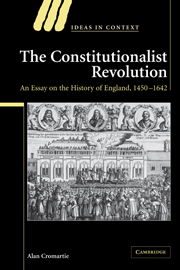Book contents
- Frontmatter
- Contents
- Acknowledgements
- Introduction
- 1 Fortescue's world
- 2 St German's world
- 3 Reformation and the body politic
- 4 Commonwealth and common law
- 5 Puritans and Anglicans
- 6 James, kingship, and religion
- 7 Law, politics, and Sir Edward Coke
- 8 The constitutionalist revolution
- Epilogue: the constitutionalism of John Locke
- Bibliography
- Index
- IDEAS IN CONTEXT
Epilogue: the constitutionalism of John Locke
Published online by Cambridge University Press: 10 December 2009
- Frontmatter
- Contents
- Acknowledgements
- Introduction
- 1 Fortescue's world
- 2 St German's world
- 3 Reformation and the body politic
- 4 Commonwealth and common law
- 5 Puritans and Anglicans
- 6 James, kingship, and religion
- 7 Law, politics, and Sir Edward Coke
- 8 The constitutionalist revolution
- Epilogue: the constitutionalism of John Locke
- Bibliography
- Index
- IDEAS IN CONTEXT
Summary
At the end of Locke's life, a clerical admirer took down the great philosopher's ‘Extempore Advice’ about the reading for a ‘gentleman’. The guidance that Locke offered was interestingly shaped by social and political assumptions. A gentleman, he held, was a man
whose proper calling is the service of his country; and so is most properly concerned in moral, and political knowledge; and thus the studies which more immediately belong to his calling, are those which also treat of virtues and vices, of civil society, and the arts of government, and so will take in also law and history.
To be a gentleman, in fact, was properly to have a public function, but Locke's conception of the role left space for literary composition; he held that ‘the greatest part of [a gentleman's] business and usefulness in the world is by the influence of what he says or writes to others’. The writing of Two treatises was thus a form of gentlemanly action. So too, perhaps, if rather less directly, was the detailed under-labouring of An essay concerning human understanding, a work whose title page ascribed its author the needless honorific ‘John Locke, Gent.’ But at all events, the subject that he knew as ‘politics’ was manifestly central to a gentleman's concerns.
When the ‘Extempore Advice’ came to discuss the topic, it started by distinguishing two largely independent enterprises: ‘politics contains two parts very different the one from the other.
- Type
- Chapter
- Information
- The Constitutionalist RevolutionAn Essay on the History of England, 1450–1642, pp. 275 - 282Publisher: Cambridge University PressPrint publication year: 2006



